CPA Ethics and Governance: Case Study Analysis and Recommendations
VerifiedAdded on 2020/02/24
|10
|2146
|64
Report
AI Summary
This report provides a comprehensive analysis of a CPA ethics and governance case study. It begins by introducing the importance of ethical principles in accounting, particularly referencing the APES 110 Code of Ethics. The report identifies two key ethical issues: inappropriate management of financial reports and misuse of community improvement funds. It then examines breaches of professional competence and due care, specifically citing sections 290 and 291 of the Audit and Review Engagement. The report explores the ethical decision-making process, recommending the Laura Nash model for addressing the case's ethical dilemmas. It emphasizes the importance of professional behavior and adherence to relevant laws and regulations to maintain the integrity of the accounting profession. The conclusion reinforces the significance of ethical conduct and the role of the APES 110 guidelines in guiding accountants' actions.
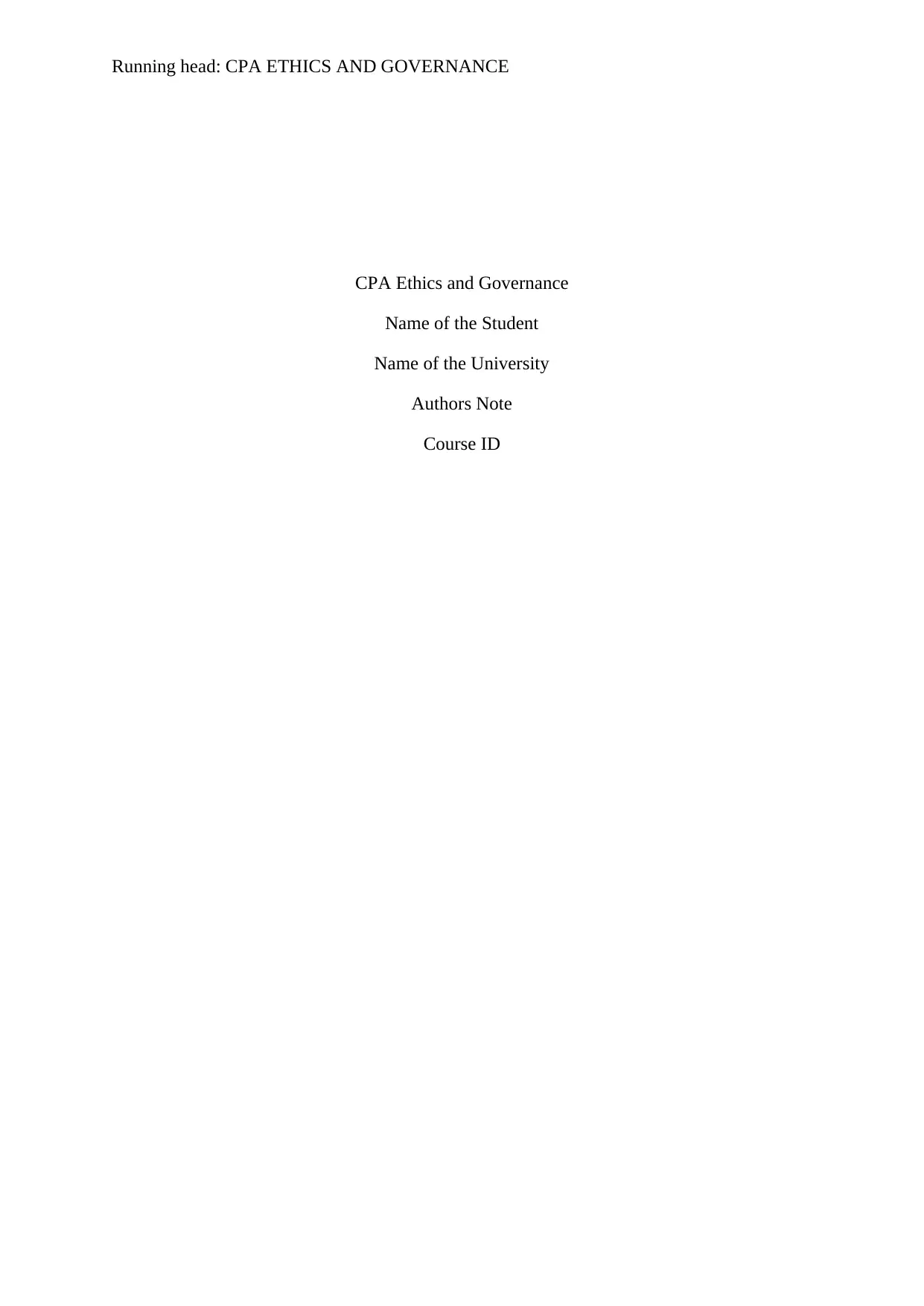
Running head: CPA ETHICS AND GOVERNANCE
CPA Ethics and Governance
Name of the Student
Name of the University
Authors Note
Course ID
CPA Ethics and Governance
Name of the Student
Name of the University
Authors Note
Course ID
Paraphrase This Document
Need a fresh take? Get an instant paraphrase of this document with our AI Paraphraser
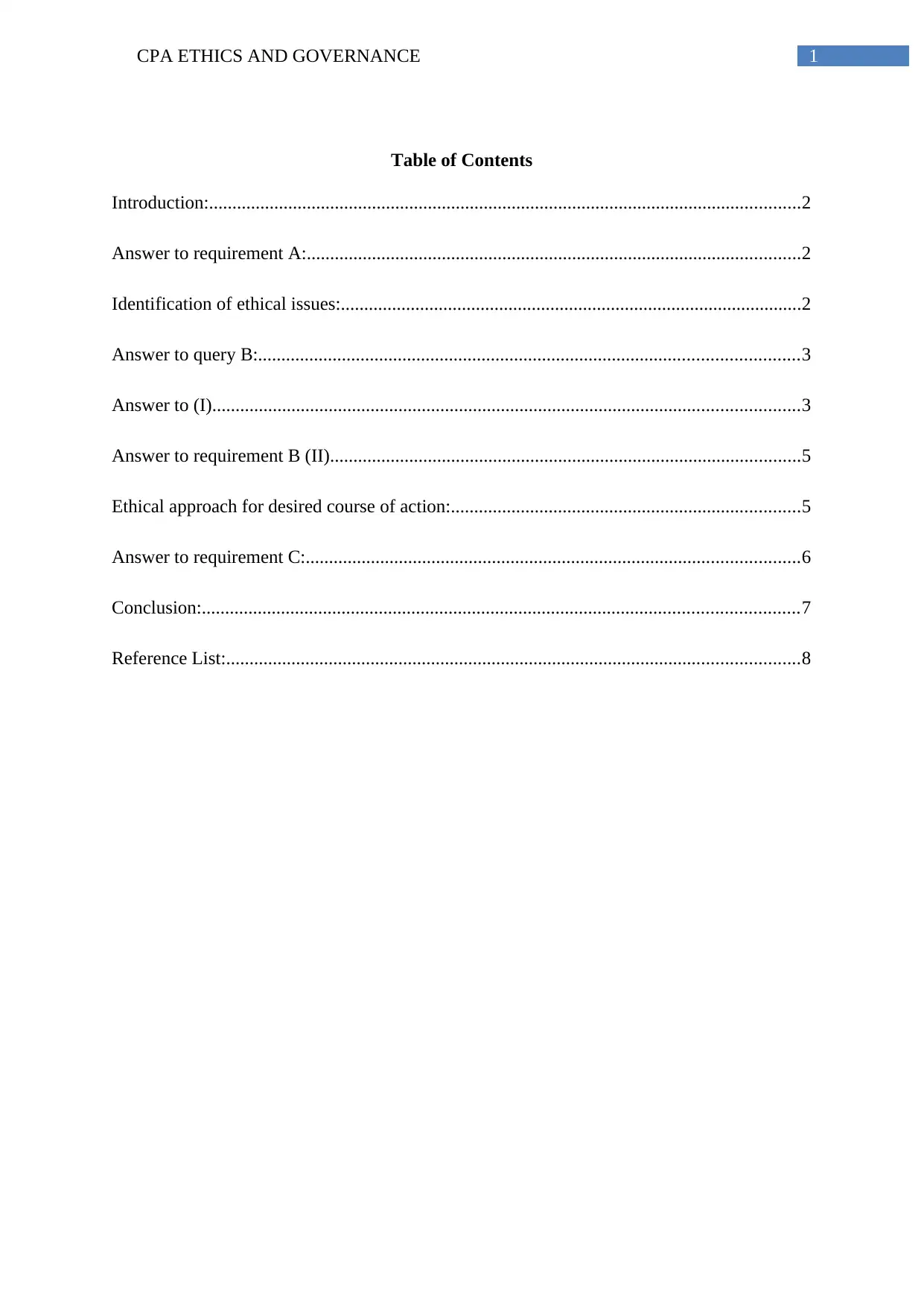
1CPA ETHICS AND GOVERNANCE
Table of Contents
Introduction:...............................................................................................................................2
Answer to requirement A:..........................................................................................................2
Identification of ethical issues:...................................................................................................2
Answer to query B:....................................................................................................................3
Answer to (I)..............................................................................................................................3
Answer to requirement B (II).....................................................................................................5
Ethical approach for desired course of action:...........................................................................5
Answer to requirement C:..........................................................................................................6
Conclusion:................................................................................................................................7
Reference List:...........................................................................................................................8
Table of Contents
Introduction:...............................................................................................................................2
Answer to requirement A:..........................................................................................................2
Identification of ethical issues:...................................................................................................2
Answer to query B:....................................................................................................................3
Answer to (I)..............................................................................................................................3
Answer to requirement B (II).....................................................................................................5
Ethical approach for desired course of action:...........................................................................5
Answer to requirement C:..........................................................................................................6
Conclusion:................................................................................................................................7
Reference List:...........................................................................................................................8
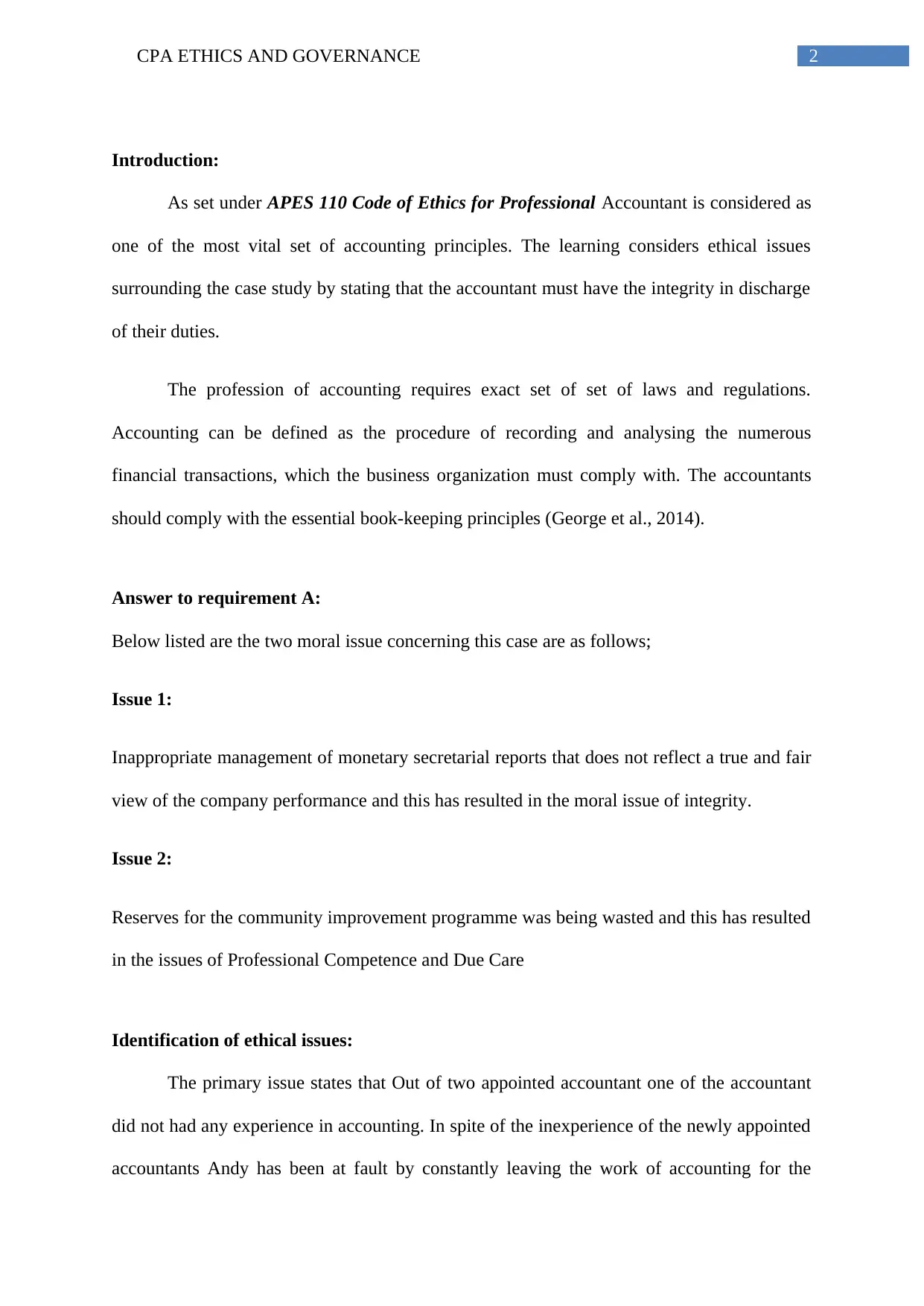
2CPA ETHICS AND GOVERNANCE
Introduction:
As set under APES 110 Code of Ethics for Professional Accountant is considered as
one of the most vital set of accounting principles. The learning considers ethical issues
surrounding the case study by stating that the accountant must have the integrity in discharge
of their duties.
The profession of accounting requires exact set of set of laws and regulations.
Accounting can be defined as the procedure of recording and analysing the numerous
financial transactions, which the business organization must comply with. The accountants
should comply with the essential book-keeping principles (George et al., 2014).
Answer to requirement A:
Below listed are the two moral issue concerning this case are as follows;
Issue 1:
Inappropriate management of monetary secretarial reports that does not reflect a true and fair
view of the company performance and this has resulted in the moral issue of integrity.
Issue 2:
Reserves for the community improvement programme was being wasted and this has resulted
in the issues of Professional Competence and Due Care
Identification of ethical issues:
The primary issue states that Out of two appointed accountant one of the accountant
did not had any experience in accounting. In spite of the inexperience of the newly appointed
accountants Andy has been at fault by constantly leaving the work of accounting for the
Introduction:
As set under APES 110 Code of Ethics for Professional Accountant is considered as
one of the most vital set of accounting principles. The learning considers ethical issues
surrounding the case study by stating that the accountant must have the integrity in discharge
of their duties.
The profession of accounting requires exact set of set of laws and regulations.
Accounting can be defined as the procedure of recording and analysing the numerous
financial transactions, which the business organization must comply with. The accountants
should comply with the essential book-keeping principles (George et al., 2014).
Answer to requirement A:
Below listed are the two moral issue concerning this case are as follows;
Issue 1:
Inappropriate management of monetary secretarial reports that does not reflect a true and fair
view of the company performance and this has resulted in the moral issue of integrity.
Issue 2:
Reserves for the community improvement programme was being wasted and this has resulted
in the issues of Professional Competence and Due Care
Identification of ethical issues:
The primary issue states that Out of two appointed accountant one of the accountant
did not had any experience in accounting. In spite of the inexperience of the newly appointed
accountants Andy has been at fault by constantly leaving the work of accounting for the
⊘ This is a preview!⊘
Do you want full access?
Subscribe today to unlock all pages.

Trusted by 1+ million students worldwide
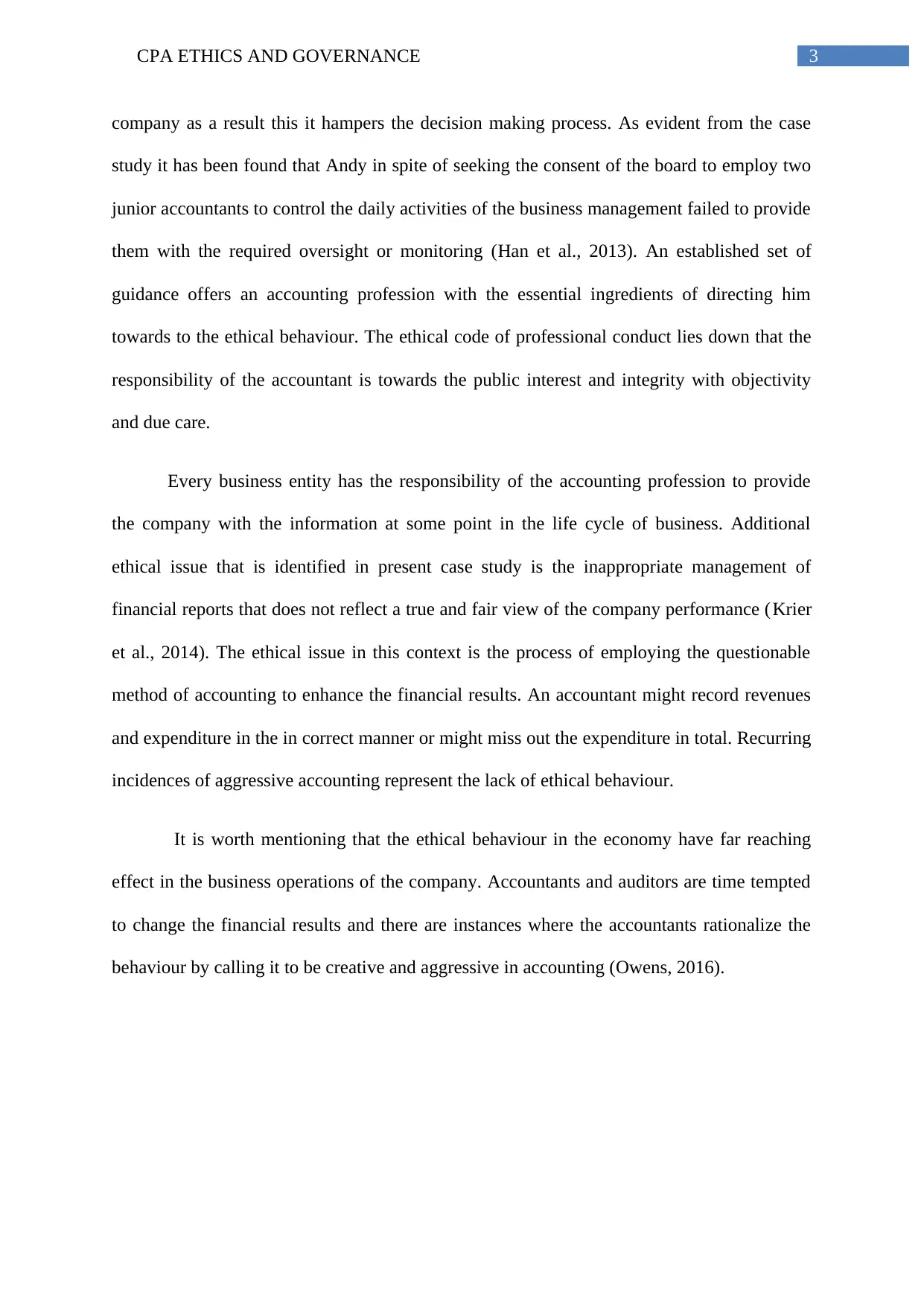
3CPA ETHICS AND GOVERNANCE
company as a result this it hampers the decision making process. As evident from the case
study it has been found that Andy in spite of seeking the consent of the board to employ two
junior accountants to control the daily activities of the business management failed to provide
them with the required oversight or monitoring (Han et al., 2013). An established set of
guidance offers an accounting profession with the essential ingredients of directing him
towards to the ethical behaviour. The ethical code of professional conduct lies down that the
responsibility of the accountant is towards the public interest and integrity with objectivity
and due care.
Every business entity has the responsibility of the accounting profession to provide
the company with the information at some point in the life cycle of business. Additional
ethical issue that is identified in present case study is the inappropriate management of
financial reports that does not reflect a true and fair view of the company performance (Krier
et al., 2014). The ethical issue in this context is the process of employing the questionable
method of accounting to enhance the financial results. An accountant might record revenues
and expenditure in the in correct manner or might miss out the expenditure in total. Recurring
incidences of aggressive accounting represent the lack of ethical behaviour.
It is worth mentioning that the ethical behaviour in the economy have far reaching
effect in the business operations of the company. Accountants and auditors are time tempted
to change the financial results and there are instances where the accountants rationalize the
behaviour by calling it to be creative and aggressive in accounting (Owens, 2016).
company as a result this it hampers the decision making process. As evident from the case
study it has been found that Andy in spite of seeking the consent of the board to employ two
junior accountants to control the daily activities of the business management failed to provide
them with the required oversight or monitoring (Han et al., 2013). An established set of
guidance offers an accounting profession with the essential ingredients of directing him
towards to the ethical behaviour. The ethical code of professional conduct lies down that the
responsibility of the accountant is towards the public interest and integrity with objectivity
and due care.
Every business entity has the responsibility of the accounting profession to provide
the company with the information at some point in the life cycle of business. Additional
ethical issue that is identified in present case study is the inappropriate management of
financial reports that does not reflect a true and fair view of the company performance (Krier
et al., 2014). The ethical issue in this context is the process of employing the questionable
method of accounting to enhance the financial results. An accountant might record revenues
and expenditure in the in correct manner or might miss out the expenditure in total. Recurring
incidences of aggressive accounting represent the lack of ethical behaviour.
It is worth mentioning that the ethical behaviour in the economy have far reaching
effect in the business operations of the company. Accountants and auditors are time tempted
to change the financial results and there are instances where the accountants rationalize the
behaviour by calling it to be creative and aggressive in accounting (Owens, 2016).
Paraphrase This Document
Need a fresh take? Get an instant paraphrase of this document with our AI Paraphraser
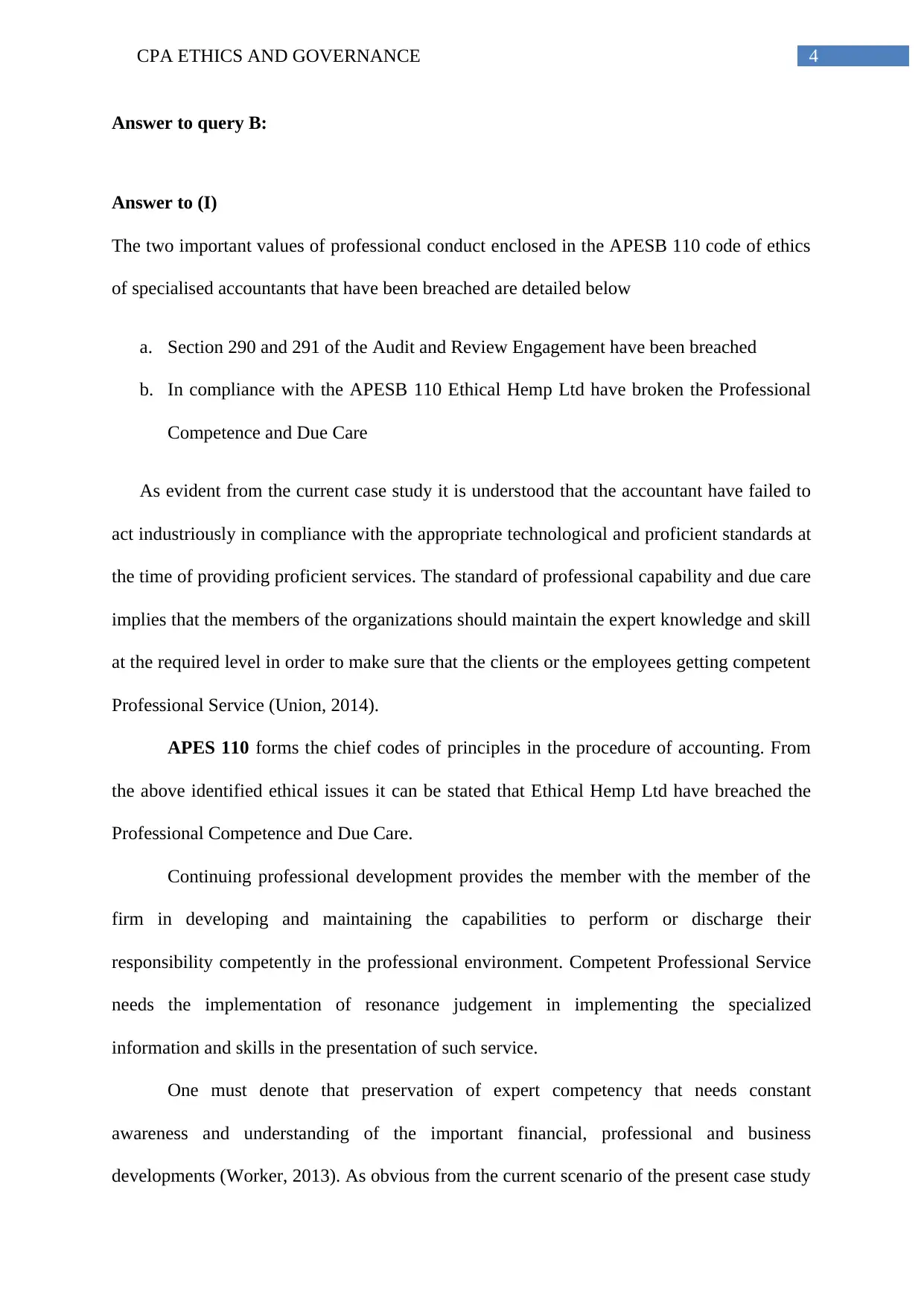
4CPA ETHICS AND GOVERNANCE
Answer to query B:
Answer to (I)
The two important values of professional conduct enclosed in the APESB 110 code of ethics
of specialised accountants that have been breached are detailed below
a. Section 290 and 291 of the Audit and Review Engagement have been breached
b. In compliance with the APESB 110 Ethical Hemp Ltd have broken the Professional
Competence and Due Care
As evident from the current case study it is understood that the accountant have failed to
act industriously in compliance with the appropriate technological and proficient standards at
the time of providing proficient services. The standard of professional capability and due care
implies that the members of the organizations should maintain the expert knowledge and skill
at the required level in order to make sure that the clients or the employees getting competent
Professional Service (Union, 2014).
APES 110 forms the chief codes of principles in the procedure of accounting. From
the above identified ethical issues it can be stated that Ethical Hemp Ltd have breached the
Professional Competence and Due Care.
Continuing professional development provides the member with the member of the
firm in developing and maintaining the capabilities to perform or discharge their
responsibility competently in the professional environment. Competent Professional Service
needs the implementation of resonance judgement in implementing the specialized
information and skills in the presentation of such service.
One must denote that preservation of expert competency that needs constant
awareness and understanding of the important financial, professional and business
developments (Worker, 2013). As obvious from the current scenario of the present case study
Answer to query B:
Answer to (I)
The two important values of professional conduct enclosed in the APESB 110 code of ethics
of specialised accountants that have been breached are detailed below
a. Section 290 and 291 of the Audit and Review Engagement have been breached
b. In compliance with the APESB 110 Ethical Hemp Ltd have broken the Professional
Competence and Due Care
As evident from the current case study it is understood that the accountant have failed to
act industriously in compliance with the appropriate technological and proficient standards at
the time of providing proficient services. The standard of professional capability and due care
implies that the members of the organizations should maintain the expert knowledge and skill
at the required level in order to make sure that the clients or the employees getting competent
Professional Service (Union, 2014).
APES 110 forms the chief codes of principles in the procedure of accounting. From
the above identified ethical issues it can be stated that Ethical Hemp Ltd have breached the
Professional Competence and Due Care.
Continuing professional development provides the member with the member of the
firm in developing and maintaining the capabilities to perform or discharge their
responsibility competently in the professional environment. Competent Professional Service
needs the implementation of resonance judgement in implementing the specialized
information and skills in the presentation of such service.
One must denote that preservation of expert competency that needs constant
awareness and understanding of the important financial, professional and business
developments (Worker, 2013). As obvious from the current scenario of the present case study
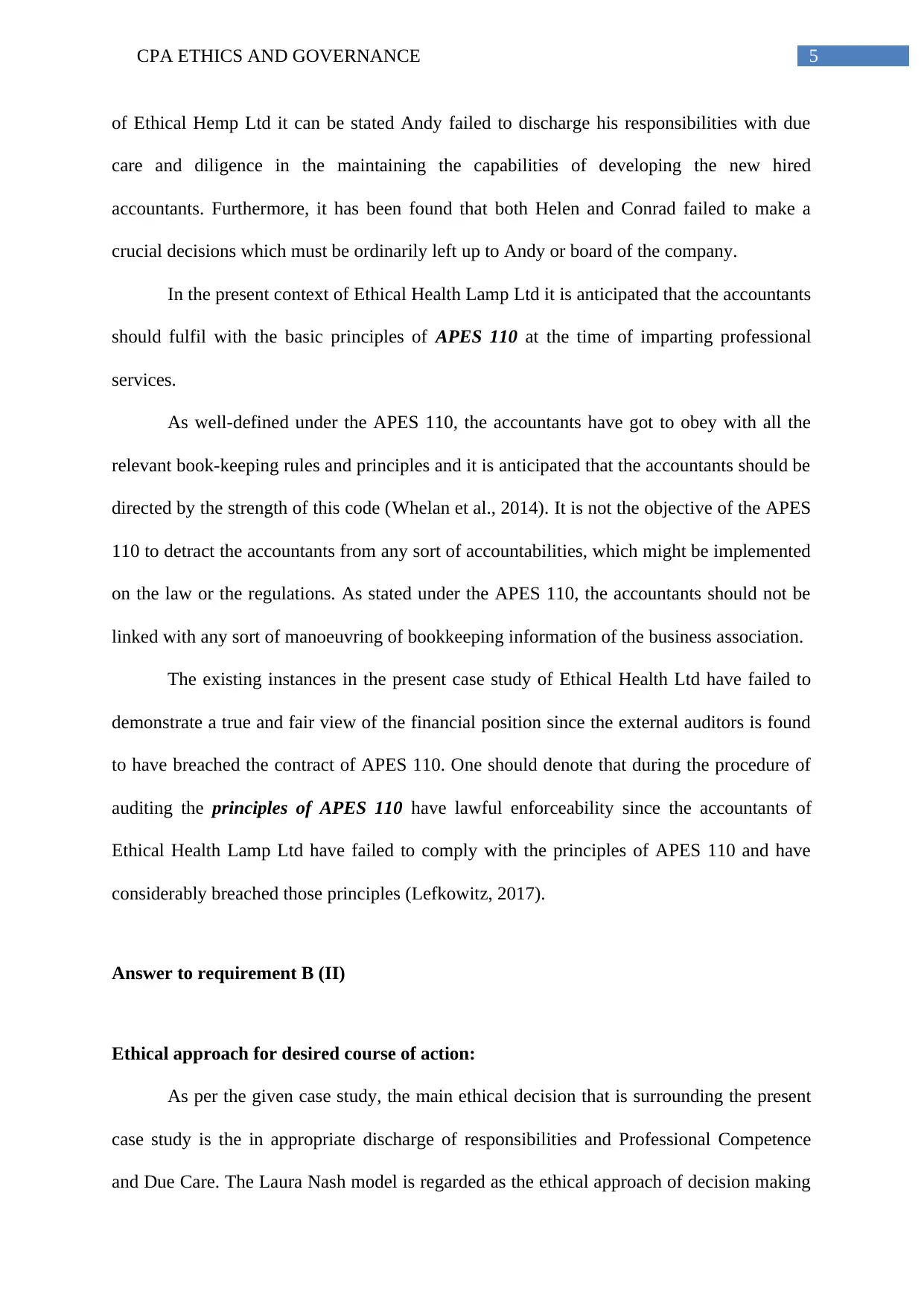
5CPA ETHICS AND GOVERNANCE
of Ethical Hemp Ltd it can be stated Andy failed to discharge his responsibilities with due
care and diligence in the maintaining the capabilities of developing the new hired
accountants. Furthermore, it has been found that both Helen and Conrad failed to make a
crucial decisions which must be ordinarily left up to Andy or board of the company.
In the present context of Ethical Health Lamp Ltd it is anticipated that the accountants
should fulfil with the basic principles of APES 110 at the time of imparting professional
services.
As well-defined under the APES 110, the accountants have got to obey with all the
relevant book-keeping rules and principles and it is anticipated that the accountants should be
directed by the strength of this code (Whelan et al., 2014). It is not the objective of the APES
110 to detract the accountants from any sort of accountabilities, which might be implemented
on the law or the regulations. As stated under the APES 110, the accountants should not be
linked with any sort of manoeuvring of bookkeeping information of the business association.
The existing instances in the present case study of Ethical Health Ltd have failed to
demonstrate a true and fair view of the financial position since the external auditors is found
to have breached the contract of APES 110. One should denote that during the procedure of
auditing the principles of APES 110 have lawful enforceability since the accountants of
Ethical Health Lamp Ltd have failed to comply with the principles of APES 110 and have
considerably breached those principles (Lefkowitz, 2017).
Answer to requirement B (II)
Ethical approach for desired course of action:
As per the given case study, the main ethical decision that is surrounding the present
case study is the in appropriate discharge of responsibilities and Professional Competence
and Due Care. The Laura Nash model is regarded as the ethical approach of decision making
of Ethical Hemp Ltd it can be stated Andy failed to discharge his responsibilities with due
care and diligence in the maintaining the capabilities of developing the new hired
accountants. Furthermore, it has been found that both Helen and Conrad failed to make a
crucial decisions which must be ordinarily left up to Andy or board of the company.
In the present context of Ethical Health Lamp Ltd it is anticipated that the accountants
should fulfil with the basic principles of APES 110 at the time of imparting professional
services.
As well-defined under the APES 110, the accountants have got to obey with all the
relevant book-keeping rules and principles and it is anticipated that the accountants should be
directed by the strength of this code (Whelan et al., 2014). It is not the objective of the APES
110 to detract the accountants from any sort of accountabilities, which might be implemented
on the law or the regulations. As stated under the APES 110, the accountants should not be
linked with any sort of manoeuvring of bookkeeping information of the business association.
The existing instances in the present case study of Ethical Health Ltd have failed to
demonstrate a true and fair view of the financial position since the external auditors is found
to have breached the contract of APES 110. One should denote that during the procedure of
auditing the principles of APES 110 have lawful enforceability since the accountants of
Ethical Health Lamp Ltd have failed to comply with the principles of APES 110 and have
considerably breached those principles (Lefkowitz, 2017).
Answer to requirement B (II)
Ethical approach for desired course of action:
As per the given case study, the main ethical decision that is surrounding the present
case study is the in appropriate discharge of responsibilities and Professional Competence
and Due Care. The Laura Nash model is regarded as the ethical approach of decision making
⊘ This is a preview!⊘
Do you want full access?
Subscribe today to unlock all pages.

Trusted by 1+ million students worldwide
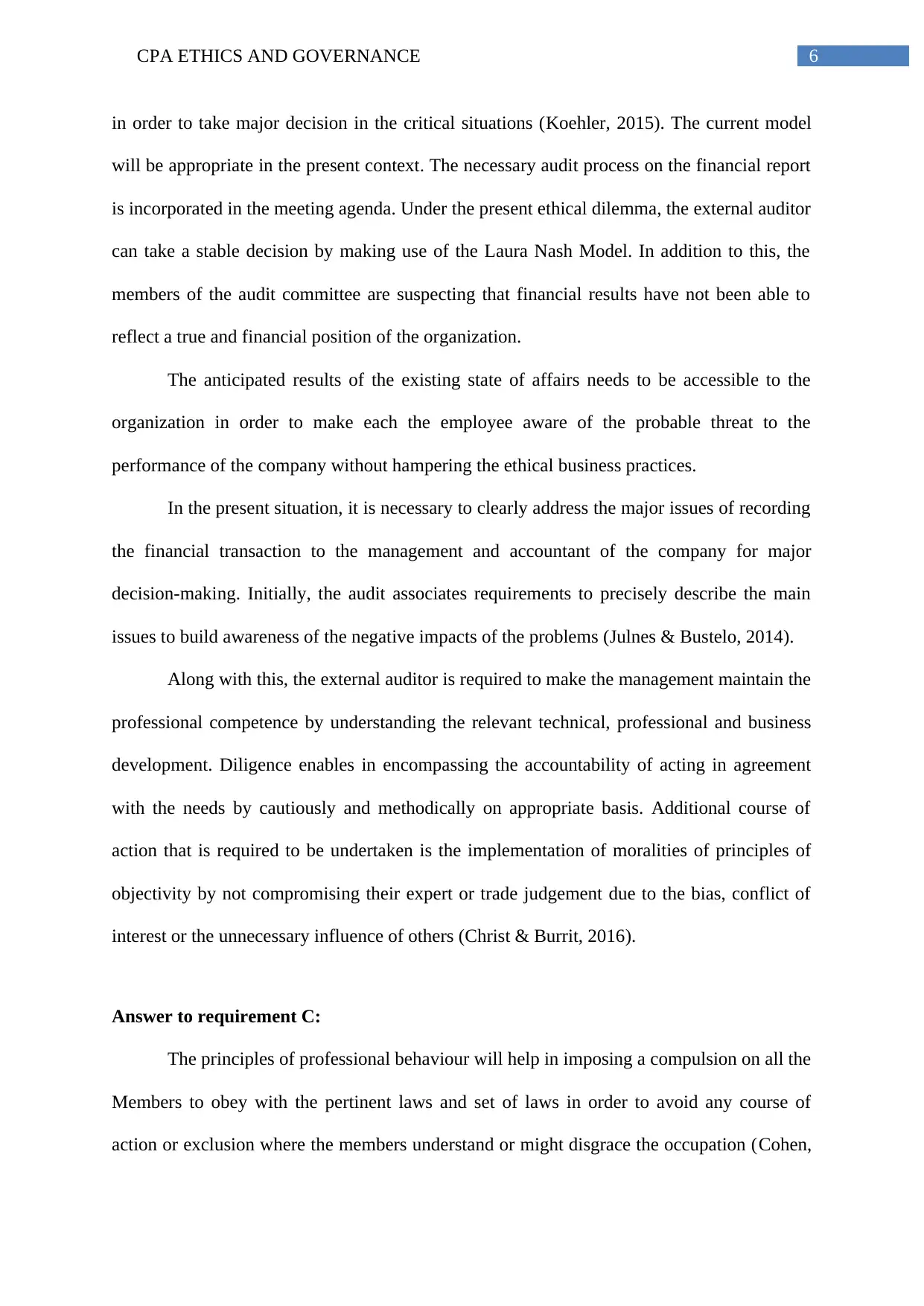
6CPA ETHICS AND GOVERNANCE
in order to take major decision in the critical situations (Koehler, 2015). The current model
will be appropriate in the present context. The necessary audit process on the financial report
is incorporated in the meeting agenda. Under the present ethical dilemma, the external auditor
can take a stable decision by making use of the Laura Nash Model. In addition to this, the
members of the audit committee are suspecting that financial results have not been able to
reflect a true and financial position of the organization.
The anticipated results of the existing state of affairs needs to be accessible to the
organization in order to make each the employee aware of the probable threat to the
performance of the company without hampering the ethical business practices.
In the present situation, it is necessary to clearly address the major issues of recording
the financial transaction to the management and accountant of the company for major
decision-making. Initially, the audit associates requirements to precisely describe the main
issues to build awareness of the negative impacts of the problems (Julnes & Bustelo, 2014).
Along with this, the external auditor is required to make the management maintain the
professional competence by understanding the relevant technical, professional and business
development. Diligence enables in encompassing the accountability of acting in agreement
with the needs by cautiously and methodically on appropriate basis. Additional course of
action that is required to be undertaken is the implementation of moralities of principles of
objectivity by not compromising their expert or trade judgement due to the bias, conflict of
interest or the unnecessary influence of others (Christ & Burrit, 2016).
Answer to requirement C:
The principles of professional behaviour will help in imposing a compulsion on all the
Members to obey with the pertinent laws and set of laws in order to avoid any course of
action or exclusion where the members understand or might disgrace the occupation (Cohen,
in order to take major decision in the critical situations (Koehler, 2015). The current model
will be appropriate in the present context. The necessary audit process on the financial report
is incorporated in the meeting agenda. Under the present ethical dilemma, the external auditor
can take a stable decision by making use of the Laura Nash Model. In addition to this, the
members of the audit committee are suspecting that financial results have not been able to
reflect a true and financial position of the organization.
The anticipated results of the existing state of affairs needs to be accessible to the
organization in order to make each the employee aware of the probable threat to the
performance of the company without hampering the ethical business practices.
In the present situation, it is necessary to clearly address the major issues of recording
the financial transaction to the management and accountant of the company for major
decision-making. Initially, the audit associates requirements to precisely describe the main
issues to build awareness of the negative impacts of the problems (Julnes & Bustelo, 2014).
Along with this, the external auditor is required to make the management maintain the
professional competence by understanding the relevant technical, professional and business
development. Diligence enables in encompassing the accountability of acting in agreement
with the needs by cautiously and methodically on appropriate basis. Additional course of
action that is required to be undertaken is the implementation of moralities of principles of
objectivity by not compromising their expert or trade judgement due to the bias, conflict of
interest or the unnecessary influence of others (Christ & Burrit, 2016).
Answer to requirement C:
The principles of professional behaviour will help in imposing a compulsion on all the
Members to obey with the pertinent laws and set of laws in order to avoid any course of
action or exclusion where the members understand or might disgrace the occupation (Cohen,
Paraphrase This Document
Need a fresh take? Get an instant paraphrase of this document with our AI Paraphraser
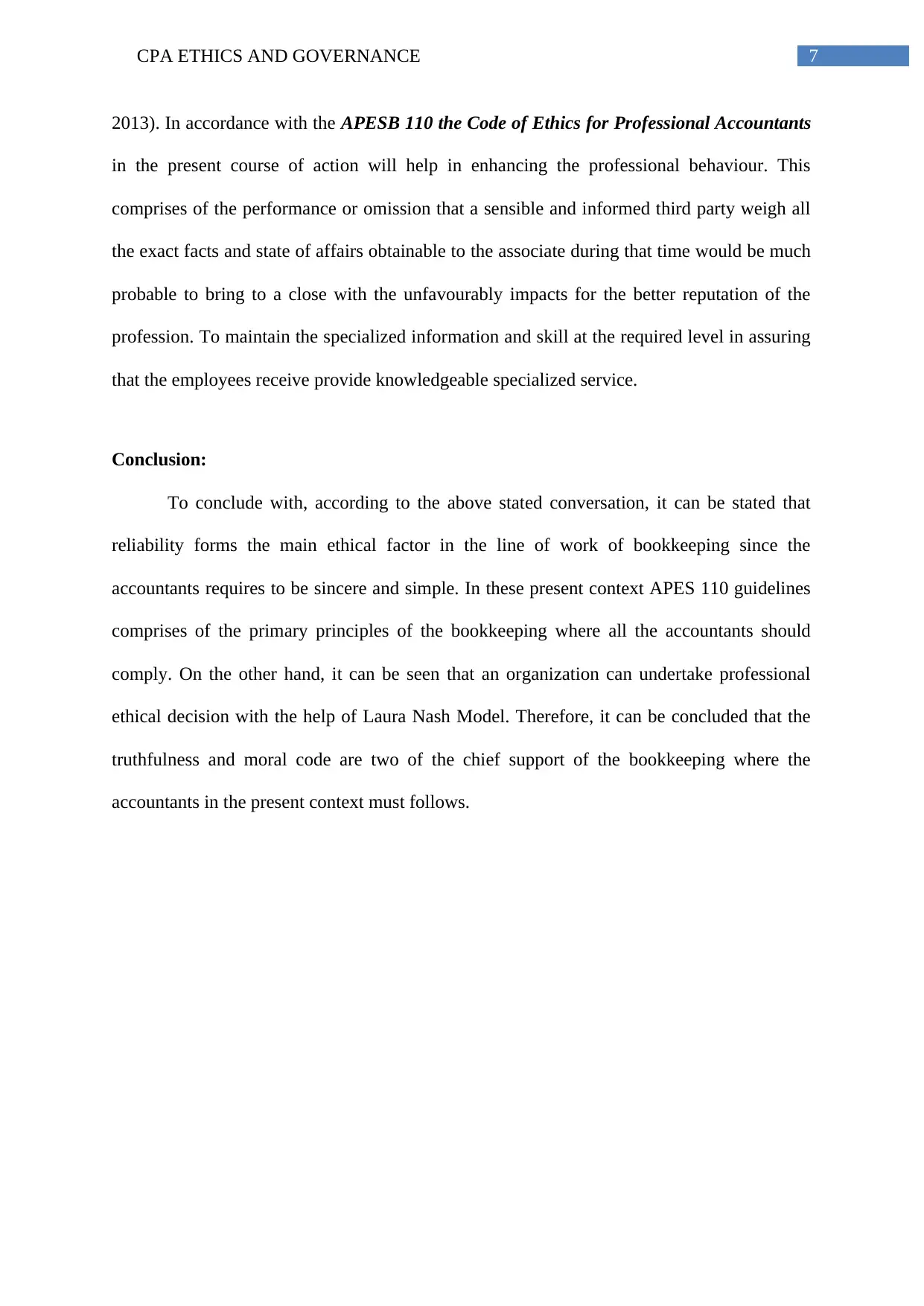
7CPA ETHICS AND GOVERNANCE
2013). In accordance with the APESB 110 the Code of Ethics for Professional Accountants
in the present course of action will help in enhancing the professional behaviour. This
comprises of the performance or omission that a sensible and informed third party weigh all
the exact facts and state of affairs obtainable to the associate during that time would be much
probable to bring to a close with the unfavourably impacts for the better reputation of the
profession. To maintain the specialized information and skill at the required level in assuring
that the employees receive provide knowledgeable specialized service.
Conclusion:
To conclude with, according to the above stated conversation, it can be stated that
reliability forms the main ethical factor in the line of work of bookkeeping since the
accountants requires to be sincere and simple. In these present context APES 110 guidelines
comprises of the primary principles of the bookkeeping where all the accountants should
comply. On the other hand, it can be seen that an organization can undertake professional
ethical decision with the help of Laura Nash Model. Therefore, it can be concluded that the
truthfulness and moral code are two of the chief support of the bookkeeping where the
accountants in the present context must follows.
2013). In accordance with the APESB 110 the Code of Ethics for Professional Accountants
in the present course of action will help in enhancing the professional behaviour. This
comprises of the performance or omission that a sensible and informed third party weigh all
the exact facts and state of affairs obtainable to the associate during that time would be much
probable to bring to a close with the unfavourably impacts for the better reputation of the
profession. To maintain the specialized information and skill at the required level in assuring
that the employees receive provide knowledgeable specialized service.
Conclusion:
To conclude with, according to the above stated conversation, it can be stated that
reliability forms the main ethical factor in the line of work of bookkeeping since the
accountants requires to be sincere and simple. In these present context APES 110 guidelines
comprises of the primary principles of the bookkeeping where all the accountants should
comply. On the other hand, it can be seen that an organization can undertake professional
ethical decision with the help of Laura Nash Model. Therefore, it can be concluded that the
truthfulness and moral code are two of the chief support of the bookkeeping where the
accountants in the present context must follows.
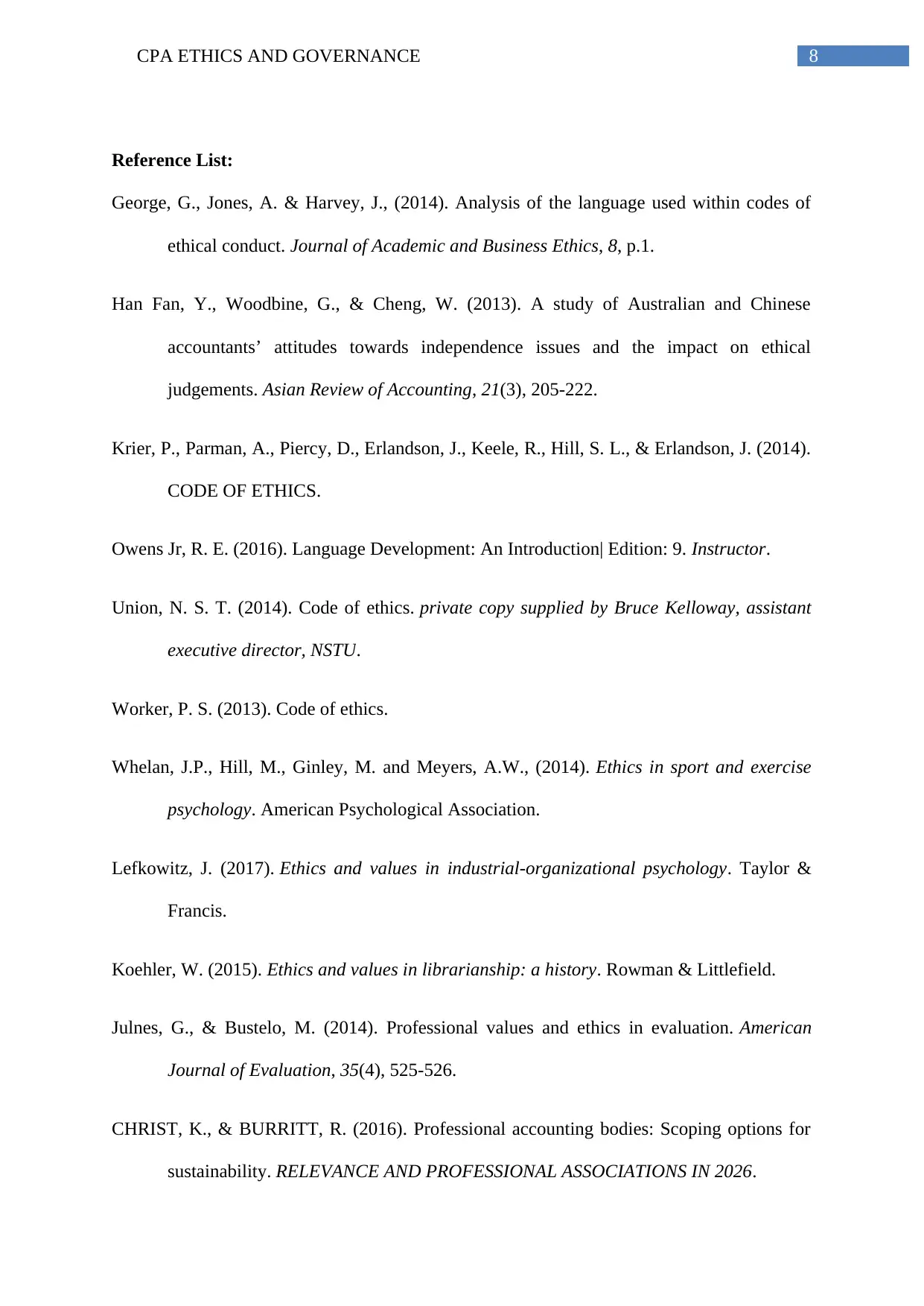
8CPA ETHICS AND GOVERNANCE
Reference List:
George, G., Jones, A. & Harvey, J., (2014). Analysis of the language used within codes of
ethical conduct. Journal of Academic and Business Ethics, 8, p.1.
Han Fan, Y., Woodbine, G., & Cheng, W. (2013). A study of Australian and Chinese
accountants’ attitudes towards independence issues and the impact on ethical
judgements. Asian Review of Accounting, 21(3), 205-222.
Krier, P., Parman, A., Piercy, D., Erlandson, J., Keele, R., Hill, S. L., & Erlandson, J. (2014).
CODE OF ETHICS.
Owens Jr, R. E. (2016). Language Development: An Introduction| Edition: 9. Instructor.
Union, N. S. T. (2014). Code of ethics. private copy supplied by Bruce Kelloway, assistant
executive director, NSTU.
Worker, P. S. (2013). Code of ethics.
Whelan, J.P., Hill, M., Ginley, M. and Meyers, A.W., (2014). Ethics in sport and exercise
psychology. American Psychological Association.
Lefkowitz, J. (2017). Ethics and values in industrial-organizational psychology. Taylor &
Francis.
Koehler, W. (2015). Ethics and values in librarianship: a history. Rowman & Littlefield.
Julnes, G., & Bustelo, M. (2014). Professional values and ethics in evaluation. American
Journal of Evaluation, 35(4), 525-526.
CHRIST, K., & BURRITT, R. (2016). Professional accounting bodies: Scoping options for
sustainability. RELEVANCE AND PROFESSIONAL ASSOCIATIONS IN 2026.
Reference List:
George, G., Jones, A. & Harvey, J., (2014). Analysis of the language used within codes of
ethical conduct. Journal of Academic and Business Ethics, 8, p.1.
Han Fan, Y., Woodbine, G., & Cheng, W. (2013). A study of Australian and Chinese
accountants’ attitudes towards independence issues and the impact on ethical
judgements. Asian Review of Accounting, 21(3), 205-222.
Krier, P., Parman, A., Piercy, D., Erlandson, J., Keele, R., Hill, S. L., & Erlandson, J. (2014).
CODE OF ETHICS.
Owens Jr, R. E. (2016). Language Development: An Introduction| Edition: 9. Instructor.
Union, N. S. T. (2014). Code of ethics. private copy supplied by Bruce Kelloway, assistant
executive director, NSTU.
Worker, P. S. (2013). Code of ethics.
Whelan, J.P., Hill, M., Ginley, M. and Meyers, A.W., (2014). Ethics in sport and exercise
psychology. American Psychological Association.
Lefkowitz, J. (2017). Ethics and values in industrial-organizational psychology. Taylor &
Francis.
Koehler, W. (2015). Ethics and values in librarianship: a history. Rowman & Littlefield.
Julnes, G., & Bustelo, M. (2014). Professional values and ethics in evaluation. American
Journal of Evaluation, 35(4), 525-526.
CHRIST, K., & BURRITT, R. (2016). Professional accounting bodies: Scoping options for
sustainability. RELEVANCE AND PROFESSIONAL ASSOCIATIONS IN 2026.
⊘ This is a preview!⊘
Do you want full access?
Subscribe today to unlock all pages.

Trusted by 1+ million students worldwide
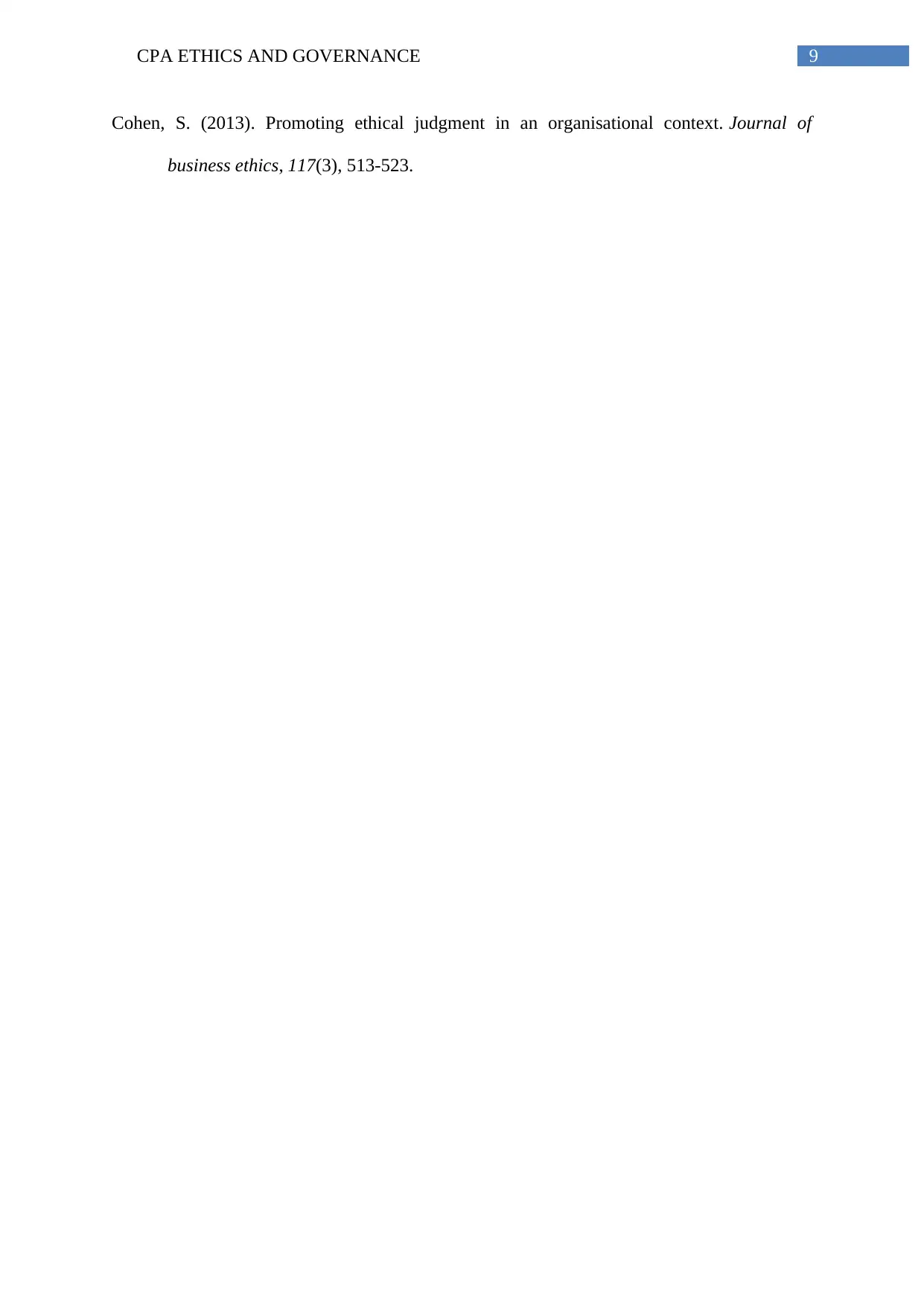
9CPA ETHICS AND GOVERNANCE
Cohen, S. (2013). Promoting ethical judgment in an organisational context. Journal of
business ethics, 117(3), 513-523.
Cohen, S. (2013). Promoting ethical judgment in an organisational context. Journal of
business ethics, 117(3), 513-523.
1 out of 10
Related Documents
Your All-in-One AI-Powered Toolkit for Academic Success.
+13062052269
info@desklib.com
Available 24*7 on WhatsApp / Email
![[object Object]](/_next/static/media/star-bottom.7253800d.svg)
Unlock your academic potential
Copyright © 2020–2026 A2Z Services. All Rights Reserved. Developed and managed by ZUCOL.





